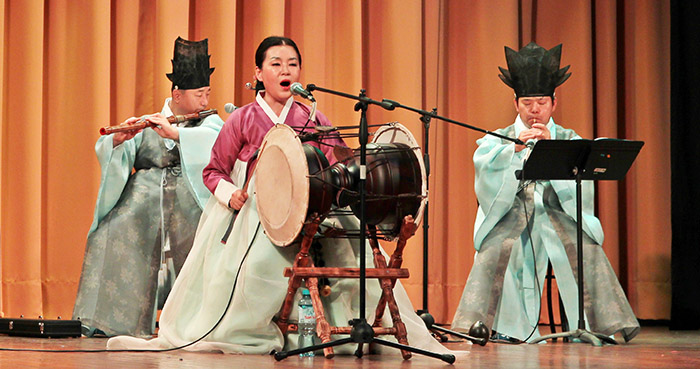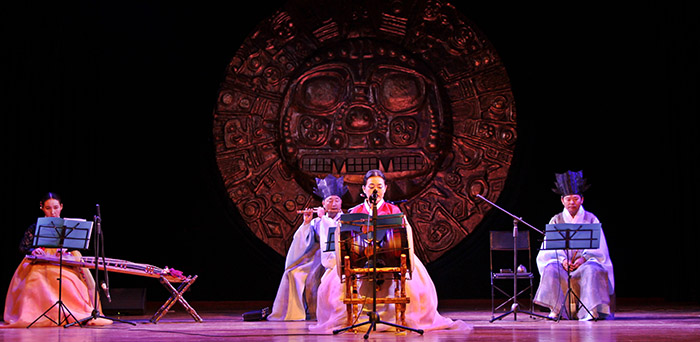Book lovers in Lima and Cusco in Peru were able to indulge themselves in classical Korean literature.
A series of special literary events were held jointly by the Ministry of Culture, Sports and Tourism and the Literature Translation Institute of Korea (LTI Korea) on Nov. 10 and 14, both at the National Agrarian University in Lima and at the Municipal Theater in Cusco. The events offered Peruvians a glimpse into Korean literature, especially classical Korean literature, in the form of symposiums and performances.


Experts from Korea and Peru gathered at the symposiums to introduce some classical works of Korean literature and then compared and contrasted their respective literary worlds. Professor of Korean Literature Kim Myeong-jun from Hallym University and Professor Go Hye-seon from the Spanish department at Dankook University were among the attendees. They gave a lecture on classical poetic songs, known as siga (시가, 詩歌), poetry that developed during medieval times in both Korea and Spain, and also on the differences between Korea and Peru.
A group of four performers from the National Gugak Center played their traditional Korean musical instruments, and performed the classical poetic songs “Urak" (우락, 羽樂), “Chunmyeongok" (춘면곡, 春眠曲) and “Gogasinjo" (고가신조, 古歌新調).
On the sidelines of the two-day events, musicians from both countries performed their own renditions of different traditional songs from each country. The Peruvian folk group Yawar played such traditional Korean tunes as “Arirang” and “Chilgapsan" (칠갑산), while the Korean performing group played the well-known Peruvian folk song “El Condor Pasa.”
“At this rare event, Peruvians had a chance to get a better understanding of Korean literature and also to recognize that the two countries share doleful sounds in their traditional songs, as well,” said an official from the LTI Korea. “This was a good opportunity to introduce both classical literature and traditional sounds of our nation to Peru, a county that has emerged as a centerpiece of the Hallyu, or the 'Korean Wave,' among other Latin American countries, where people are crazy about Korean pop music and soap operas.”
By Sohn JiAe
Korea.net Staff Writer
Photos: LTI Korea
jiae5853@korea.kr
A series of special literary events were held jointly by the Ministry of Culture, Sports and Tourism and the Literature Translation Institute of Korea (LTI Korea) on Nov. 10 and 14, both at the National Agrarian University in Lima and at the Municipal Theater in Cusco. The events offered Peruvians a glimpse into Korean literature, especially classical Korean literature, in the form of symposiums and performances.


Members from the National Gugak Center sing and play classical poetic songs at the National Agrarian University in Lima (top) and at the Municipal Theater in Cusco (bottom), both in Peru, as part of a classical literary festival co-hosted by the Ministry of Culture, Sports and Tourism and LTI Korea.
Experts from Korea and Peru gathered at the symposiums to introduce some classical works of Korean literature and then compared and contrasted their respective literary worlds. Professor of Korean Literature Kim Myeong-jun from Hallym University and Professor Go Hye-seon from the Spanish department at Dankook University were among the attendees. They gave a lecture on classical poetic songs, known as siga (시가, 詩歌), poetry that developed during medieval times in both Korea and Spain, and also on the differences between Korea and Peru.
A group of four performers from the National Gugak Center played their traditional Korean musical instruments, and performed the classical poetic songs “Urak" (우락, 羽樂), “Chunmyeongok" (춘면곡, 春眠曲) and “Gogasinjo" (고가신조, 古歌新調).
On the sidelines of the two-day events, musicians from both countries performed their own renditions of different traditional songs from each country. The Peruvian folk group Yawar played such traditional Korean tunes as “Arirang” and “Chilgapsan" (칠갑산), while the Korean performing group played the well-known Peruvian folk song “El Condor Pasa.”
“At this rare event, Peruvians had a chance to get a better understanding of Korean literature and also to recognize that the two countries share doleful sounds in their traditional songs, as well,” said an official from the LTI Korea. “This was a good opportunity to introduce both classical literature and traditional sounds of our nation to Peru, a county that has emerged as a centerpiece of the Hallyu, or the 'Korean Wave,' among other Latin American countries, where people are crazy about Korean pop music and soap operas.”
By Sohn JiAe
Korea.net Staff Writer
Photos: LTI Korea
jiae5853@korea.kr